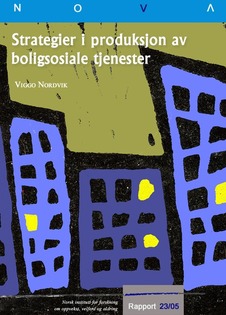| dc.description.abstract | This report analyses production of complex services to households or persons who have problems in the housing market and also in other respects. In other aspects means in our context psychiatric problems, problems related to drug/alcohol use or other types of social problems. More specifically the question of whether use of public-private-partnership can enhance efficiency and cost-effectiveness in the production of housing and related services targeted towards people with such complex problems. The analysis performed in the report is kept at a purely theoretical level. Our ambition is to supplement the theoretical analysis by empirical studies at a later stage. Design and approach to empirical studies are discussed as a part of the theoretical analysis here. Production of housing services to part of the target groups treated here can, to a varying degree, be described as supported or assisted housing, or may be even as assisted living. Assistance is in this context composed of a variety of services such as: practical assistance, somatic and psychological health services, social support and also different kinds of monitoring in order to maintain a living environment of a sufficiently good quality. The set of services treated are denoted housing related services. This set is heterogeneous and the appropriate mix of services varies strongly over individual tenants. Even within a group of receivers with quite similar characteristics we expect the needs to vary strongly. Moreover, for a single tenant the need will probably vary over time. This individual need over time does not follow any predictable pattern. Our analytical approach is that different parts of the production process are identified; these are described as a kind of activities. The most important ones are (an aggregate of different kinds of) related services, acquisition of housing units and maintenance and operation of the housing units. The costs of each of these activities and their interdependency are discussed. The need for maintenance for example, will probably depend on the quantity, quality and nature of related services provided. Hence there is a considerable need for coordination. Two factors do together feed into the need for coordination and do at the same time make coordination difficult. Firstly, production of related services and operation of housing units are quite different services and different competence is needed in them. In practise, one of the consequences of this is that different agents are responsible for the production of each of the activities. In the related services there can be many different agents involved. Secondly, there is a considerable stochastic element in the costs and it is not possible to monitor effort put into the production perfectly. This again implies that it is not possible to establish a certain assessment of whether production results and realised costs are due to realised stochastics or of effort. Hence the expected costs in one activity depend on how the agents responsible for this activity believe that other activities are handled. Based upon the analysis of costs and production activities we discuss whether there can be found suitable public-private-partnerships (PPP) in the production of housing and related services targeted towards groups with complex difficulties. PPPs are often proposed because some private agents can be more efficient in operation of housing units than public agents. When PPPs are proposed it is usually a form where some public agents produces the appropriate set of related services, while the acquisition, operation, and may be also ownership, are handled by a private agent. Also if a private agent takes care of the whole production of both housing and related services for the target groups, there will remain problems of coordination and governing the production process. This is due to the fact that the political responsibility of providing housing ad relatedservices remains with the public sector, and this responsibility can not be delegated. Even though there are severe coordination problems within a PPP, this can not alone be an argument for turning this solution down. Many of the coordination problems within a PPP would remain even if the whole production process is done within the public sector. It is; however, fair to say that the analysis in the report left the author with a sceptic attitude towards PPPs within the social housing policy field. The most important reason for this scepticism is that it is difficult to define quality in this field. It is difficult to define and even more difficult to write and to implement and enforce a contract that specifies the quality of the services provided. | en |
